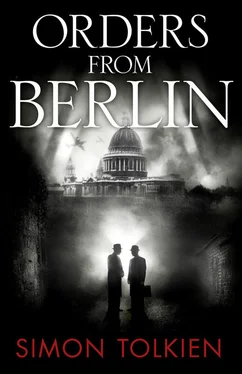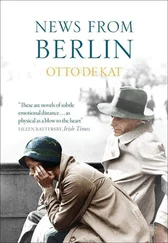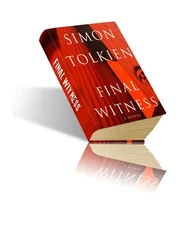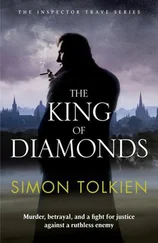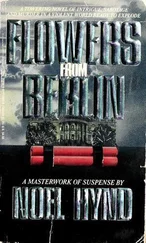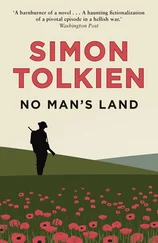Simon Tolkien - Orders from Berlin
Здесь есть возможность читать онлайн «Simon Tolkien - Orders from Berlin» — ознакомительный отрывок электронной книги совершенно бесплатно, а после прочтения отрывка купить полную версию. В некоторых случаях можно слушать аудио, скачать через торрент в формате fb2 и присутствует краткое содержание. Жанр: Полицейский детектив, на английском языке. Описание произведения, (предисловие) а так же отзывы посетителей доступны на портале библиотеки ЛибКат.
- Название:Orders from Berlin
- Автор:
- Жанр:
- Год:неизвестен
- ISBN:нет данных
- Рейтинг книги:4 / 5. Голосов: 1
-
Избранное:Добавить в избранное
- Отзывы:
-
Ваша оценка:
- 80
- 1
- 2
- 3
- 4
- 5
Orders from Berlin: краткое содержание, описание и аннотация
Предлагаем к чтению аннотацию, описание, краткое содержание или предисловие (зависит от того, что написал сам автор книги «Orders from Berlin»). Если вы не нашли необходимую информацию о книге — напишите в комментариях, мы постараемся отыскать её.
Orders from Berlin — читать онлайн ознакомительный отрывок
Ниже представлен текст книги, разбитый по страницам. Система сохранения места последней прочитанной страницы, позволяет с удобством читать онлайн бесплатно книгу «Orders from Berlin», без необходимости каждый раз заново искать на чём Вы остановились. Поставьте закладку, и сможете в любой момент перейти на страницу, на которой закончили чтение.
Интервал:
Закладка:
But then suddenly the train entered a long tunnel and everything went black. And in the darkness Trave remembered the pale, implacable face of the SS general that Thorn had shown him in the book he had taken down from Albert Morrison’s shelves the previous evening. Except that this was more than a memory; it was almost an apparition, and Trave had an overwhelming sense of the man’s extraordinary power and his terrible, relentless cruelty. And he was coming, he and his cohorts. The invasion threat was real; the SS was waiting, and rolls of barbed wire and lines of anti-tank ditches wouldn’t stop the Nazi war machine once it had landed. He knew with absolute certainty that he had to find out what Heydrich’s plan was before it was too late.
In less than a minute, the train emerged back out into the Cumbrian countryside glowing in the late afternoon sunshine, and the vision passed. But Trave remained shaken. He was glad he’d brought his gun, and he passed the rest of the journey in a state of growing impatience to reach his destination.
He changed trains at Carlisle, almost missing his connection because of the overzealousness of a detachment of the local Home Guard who were checking the papers and identity cards of the new arrivals and seemed determined to assume that everyone was a German spy until proved otherwise. But at just after six o’clock, he crossed the Scottish border and shortly afterwards arrived at the small town of Langholm, which for the first nineteen years of his life had been the home of Charles Seaforth.
The thick-stoned, grey granite buildings lining the narrow streets that radiated out from the tall spire of the Church of Scotland kirk seemed forbidding to Trave, although he liked the way the river Esk flowed through the town between mossy green banks. This border country had been a popular destination for gentleman sportsmen enjoying shooting and fishing holidays before the war put paid to such frivolities, and Trave had no doubt that the river was alive with salmon and the woods surrounding the town were full of grouse.
He booked into a travellers’ hotel in the market square and then walked down Caroline Street to Number 22, a well-kept terrace house with a walled garden in front that had been turned over to the growing of vegetables. Smoke was coming from a chimney, and the evening sun twinkled in the latticed windows. In the summer, sunset came later in the north than Trave was used to down in London.
A woman opened the door immediately, causing Trave to step back in surprise. It seemed almost as if she had been standing in her narrow hallway waiting for his knock.
‘Mrs Seaforth?’ he asked, although he was sure she was Seaforth’s mother. She had the same high, wide cheekbones and sensitive-looking, almost sculpted mouth. Trave thought she must be in her mid-sixties, but she was well preserved for her age, and he was sure that she must once have been very pretty indeed.
‘Yes,’ she said. ‘Can I help you?’
‘I’m sorry to trouble you,’ said Trave, taking out his warrant card. ‘My name’s Trave, William Trave. I’m a police officer from London, and I have some questions I need to ask you about your son.’
‘About Charles? Is he all right?’
‘Yes, he’s fine. It won’t take more than a few minutes of your time.’
‘Well, you needn’t worry about that. I’ve got all the time in the world. My husband’s down at the British Legion playing his darts tonight and I’ve only got the radio for company. You’d better come in.’ There was a slight Scots inflection to her voice, but she didn’t speak with any dialect.
Trave followed Mrs Seaforth into a cheerful room that was obviously the parlour. A fire was burning brightly in the grate, and through a wide window at the back Trave could see another garden with a magnificent white wisteria growing rampant all along the rear wall and, up above, a view of birch woods rising up a steep hillside towards the horizon. Not such a bad place to live, he thought, remembering his dark bed-sitting-room back in London, with the wail of the air-raid siren bruising his consciousness every night.
‘So sit down and make yourself comfortable,’ said his hostess, pointing to a chintz-upholstered armchair, one of a pair positioned on either side of the fireplace. ‘The kettle’s just boiled and I’ll make us some tea. I’m afraid that we don’t drink wine and spirits like you’re used to down in London. Temperance is next to godliness, as they say round here.’
‘Tea will be just fine,’ said Trave with a smile, and Mrs Seaforth bustled away out of sight, leaving her guest alone. He looked cursorily around the room, taking in at a glance a barometer by the door, a bevelled oak mirror above the fireplace, and a large framed sampler on the wall behind where he was sitting that asked the Lord to ‘bless this house’. Then he concentrated his attention on two silver-framed photographs on the mantelpiece. One was a wedding picture showing Mrs Seaforth and her second husband — it had to be her second marriage, because they were both middle-aged — standing arm in arm in front of the local church that Trave recognized from having just gone past it on his walk to the hotel from the railway station. They looked happy, Trave thought, and had probably continued happy together, judging from Mrs Seaforth’s friendly, easy-going demeanour.
The other photograph was of two boys, obviously brothers, standing side by side against a white background. At a guess, Trave would have said they were three years apart — fifteen and eighteen, perhaps. It looked older, more faded, than the wedding picture, but it had a strange unstudied quality, which surprised Trave given it was a studio portrait, which must have required the sitters to keep their positions for a long time during the exposure. The older, taller youth was dressed in a military uniform and looked out at the camera with a half-defiant, half-amused smile that was curiously attractive. He had his arm around the shoulder of the younger one, who looked up towards his brother with a devoted, happy expression — happy, Trave guessed, because he was posing for a picture with the brother he idolized.
Trave leant forward, staring hard at the picture. One of the brothers had to be Seaforth, and he guessed it was the younger one, remembering what Ava had told him about the photograph she’d seen in Seaforth’s bedroom of a young man in uniform who wasn’t Seaforth but looked like him. Trave sighed, thinking of how little he knew about the man he was trying to investigate. He wished that he had Thorn with him. Thorn would have known what questions to ask, whereas he was groping in the dark. Still, there was no help for it. He was on his own and he would just have to do his best.
‘Alistair’s the older one. He was so full of life, always laughing, devil-may-care about the world even when he was a little boy,’ said Mrs Seaforth, coming up behind Trave with the tea tray and confirming his guess about the brothers as if she had read his mind. ‘He got into endless scrapes at school, but people always forgave him because he meant well; he wore his heart on his sleeve. The girls loved him — he could have had his pick of them if he’d wanted. And Charlie worshipped him more than anyone. You can see that in the picture. They were inseparable, which was funny because they were so different,’ she went on as she poured out the tea. ‘Alistair so open-handed you could read him like a book, whereas Charlie was always looking deep into things, searching for grievances.’
‘What kind of grievances?’ asked Trave, taking his cup from Mrs Seaforth’s outstretched hand. Perhaps he could just let her talk, he thought, and wait until she said something that seemed important.
‘Oh, I don’t know. Against the English. Flodden Field, where they massacred the Scots in the sixteenth century, isn’t so far away from here. And then he hated the old squire whom my husband, Jack, worked for. He was English too. Charlie said he was exploiting us, charging us too much rent, not making repairs, not paying Jack enough money. Made him sound like he was some kind of Nazi — not that we had Nazis back then.’ Mrs Seaforth smiled, shaking her head at the memory. ‘And Charlie was right in some ways, I suppose, although it was the squire who got him an exemption from joining up in the last year of the war, which probably saved his life. But that just seemed to make him hate the old man even more. Charlie never liked being in debt to anyone. He never has and he never will.’ Mrs Seaforth paused, stirring her tea with a faraway look in her eye. ‘It all seems so long ago now,’ she said half-wistfully. ‘And the war changed everything. It’s like there was a before-the-war time and an after-the-war time, and there might have been a hundred years between the two. You’re too young to know what I mean.’ It could have sounded condescending, but it wasn’t for some reason, just a statement of fact. She looked up, catching Trave’s eye, and abruptly returned to the present. ‘Is Charlie in trouble of some kind?’ she asked. ‘I think you ought to tell me if he is.’
Читать дальшеИнтервал:
Закладка:
Похожие книги на «Orders from Berlin»
Представляем Вашему вниманию похожие книги на «Orders from Berlin» списком для выбора. Мы отобрали схожую по названию и смыслу литературу в надежде предоставить читателям больше вариантов отыскать новые, интересные, ещё непрочитанные произведения.
Обсуждение, отзывы о книге «Orders from Berlin» и просто собственные мнения читателей. Оставьте ваши комментарии, напишите, что Вы думаете о произведении, его смысле или главных героях. Укажите что конкретно понравилось, а что нет, и почему Вы так считаете.
